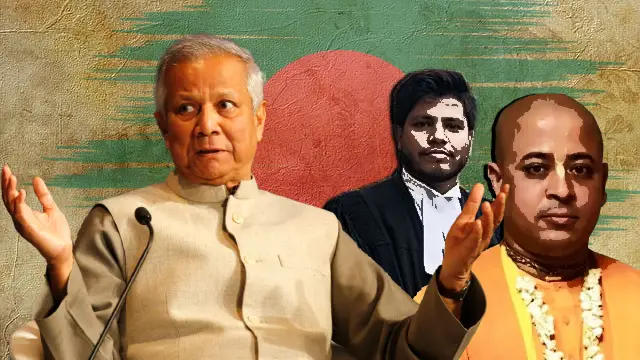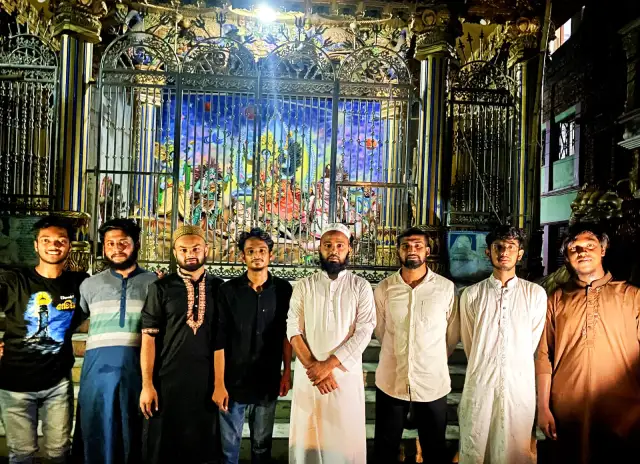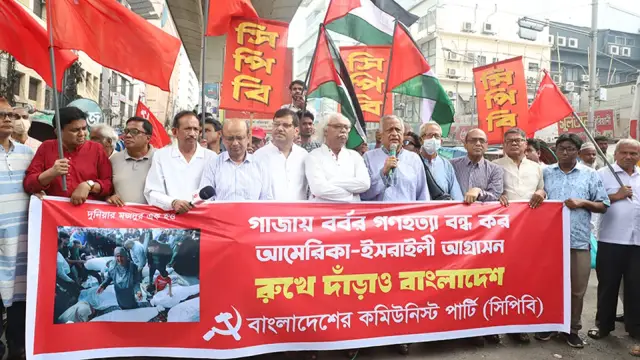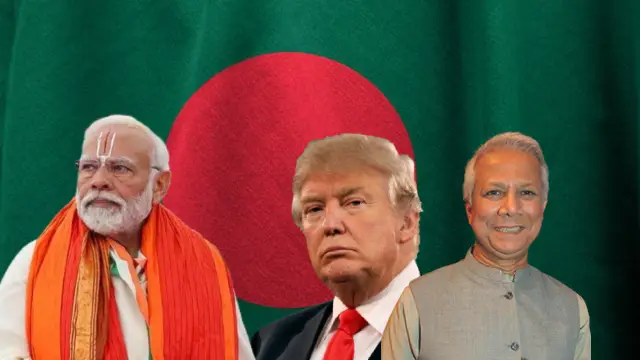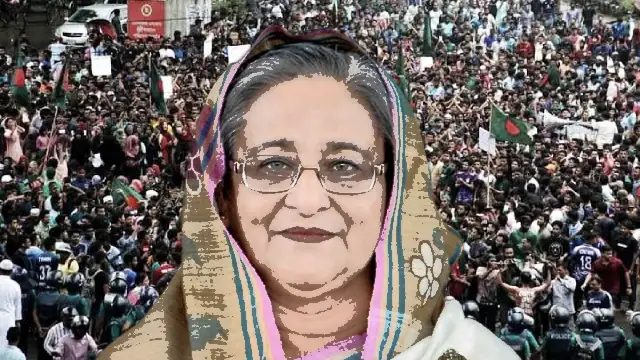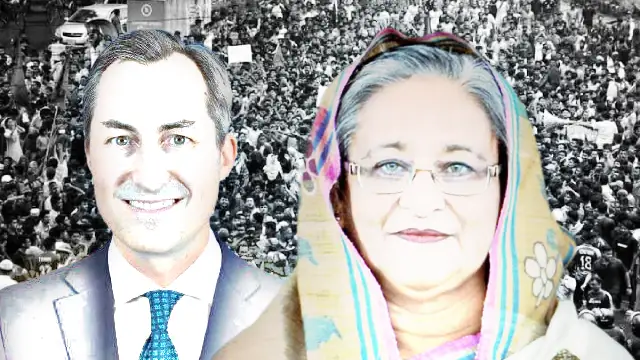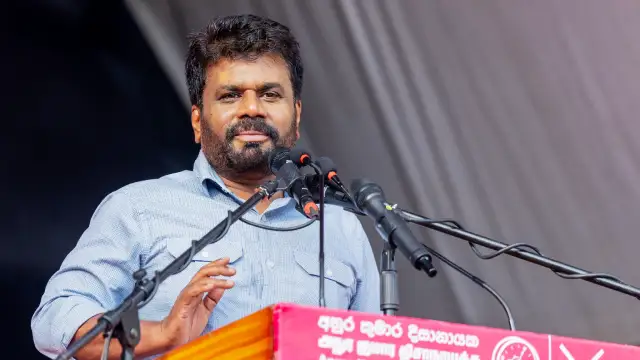In Chittagong’s Anwara Upazilla, far from the political tumult of Dhaka, Hindus like Shajib Nath live in fear—not from mobs but from security forces meant to protect them. As Indian mainstream media and government amplify the klaxon of purported atrocities against Hindus in Bangladesh and vilify the Muslim-majority country at a global scale, people like Mr Nath live in a perennial fear of retribution from Islamists and the state machinery.
“Going out of our houses, except for short daily chores, has become an enormous challenge. We are living under extreme fear; anything can happen to us. The military and police are randomly picking up anyone wearing a red thread (a religious practice among Hindus) around their wrists. We are very scared,” Mr Nath told the East Post.
Atrocities against Hindus in Bangladesh’s Chittagong have reportedly spiked after supporters of a monk-turned-Hindutva apparatchik, Chinmoy Krishna Das, allegedly lynched a Muslim lawyer, Saiful Alam Alif within a court compound.
While Mr Alif’s murder has been called the catalyst of the rising atrocities against Hindus in Bangladesh’s Chittagong, the monk’s arrest created the backdrop of the prevailing hostilities.
A monk’s arrest sparks outrage
Chandan Kumar Dhar—known as Chinmoy Krishna Das Brahmachari—used to be a monk at the International Society for Krishna Consciousness (ISKCON).
According to ISKCON, he was removed following an allegation of child sex abuse.
Since former prime minister Sheikh Hasina’s ouster due to a popular uprising on August 5th, Mr Das had been leading the Bangladesh Sammilita Sanatani Jagran Jote (BSSJJ), a Hindu organisation waging a movement over eight-point demands, until his arrest en route Dhaka’s Hazrat Shahjalal International Airport on November 25th.
He was booked for sedition charges on October 31st, along with 18 others, following a complaint from Firoz Khan, former general secretary of Mohora ward Bangladesh Nationalist Party (BNP). Mr Khan was mysteriously fired from the BNP the very next day of filing the complaint.
Mr Das’s followers allegedly hoisted the saffron banner, representing neighbouring India’s Hindutva camp, atop Bangladesh’s national flag in Chittagong in September. The incident had irked the local people and fuelled communal tensions between majority Muslims and minority Hindus.
Speaking to East Post, Adil Rayhan, a youth from Chittagong, highlighted his doubts about Mr Das’s agenda.
“His (Mr Das’s) speeches were laced with politics and he claimed that if something happens (to Hindus), India will help. He spoke like this at his rallies. It was clear that he was less interested in speaking for Hindu rights but more inclined to propagate radical thoughts, which irked a large number of people, especially Muslims,” Mr Rayhan said.
Highlighting the source of the contention, Mr Rayhan added that Hindutva groups hoisted their saffron banner atop a flagpole, above the Bangladesh national flag, at the Shadhinata Sthombho (independence pillar) at the Zero Point near the New Market intersection in Chittagong.
After his bail was denied at the court, his followers resorted to vandalism, during which Mr Alif was reportedly lynched by the Hindutva mob chanting “Jai Shree Ram”.
The 31 people booked for Mr Alif’s murder, following his brother’s complaint, are all ISKCON followers from the Bandel Road Sebak Colony under the city’s Kotwali police station.
Despite the arrests, there have been sporadic incidents of violence against Hindus. Mr Nath claims that the police have gone berserk and have arrested innocent Hindus for no reason. He escaped getting embroiled in a dispute recently.
“On Facebook, someone posted a fake story with my picture, blaming me for the murder of the Muslim advocate in Chittagong’s court. I immediately brought it to the notice of my Muslim friends, who vouched for my innocence. Some people are falsely implicating me in this case,” Mr Nath said.
According to him, many of his relatives have been suffering the ordeal in Chittagong. Those who had to travel long distances on business have dropped the idea, Mr Nath claimed.
What stirred atrocities against Hindus in Bangladesh?
Bengali experts allege India is fuelling tensions in Bangladesh for its geopolitical goals.
India never accepted the downfall of Ms Hasina, who had been a docile tool of New Delhi, her critics allege. The students’ movement was vilified in India as a CIA-sponsored movement by its mainstream media and it has been claimed that Islamist fundamentalists have seized control of the country.
India’s asylum to Ms Hasina, its ruling Hindutva camp’s high-decibel propaganda regarding purported atrocities against Hindus in Bangladesh and its mainstream media’s propaganda against the neighbouring country have been irking the Bangladeshi people.
However, the hostilities grew after Indian Prime Minister Narendra Modi emphasised the purported atrocities against Hindus in Bangladesh during his conversation with outgoing US President Joe Biden and President-elect Donald Trump.
Mr Modi’s federally ruling Bharatiya Janata Party (BJP) has capitalised on fears of “illegal Bangladeshi immigration” and demographic shifts prevalent among majority Hindus and has been using these narratives to bolster its electoral success in the country.
Bangladesh’s interim caretaker government has been trying to improve ties with India based on equality and has been opposing what they call “India’s colonialist” approach.
However, New Delhi’s obstinate stance and diplomatic prowess due to its bigger market size have stirred unrest within Bangladesh. Anti-India hatred has been growing manifold, which the Indian mainstream media projects as “anti-Hindu”. This way, critics allege, they end up helping India’s ruling bloc.
West-backed Bangladeshi activists, like Pinaki Bhattacharya, considered close to Jamat-e-Islami and BNP, have accused the global fountainhead of Hindutva, the Rashtriya Swayamsevak Sangh (RSS), which is also the parental body of Mr Modi’s federally-ruling BJP, of fuelling tensions in Bangladesh.
The majority of Bangladeshi people believe that the tensions in their country are a result of Mr Modi’s government.
India’s role and hypocrisy questioned
Apocryphal stories about atrocities against Hindus in Bangladesh have helped the BJP and the RSS to fuel Islamophobia in India and consolidate its burgeoning support base among the majority Hindu community.
When Mr Modi’s BJP-led government couldn’t prevent the downfall of Ms Hasina, it went on to peddle a misinformation campaign regarding atrocities against Hindus in Bangladesh, critics in Dhaka allege.
While there has been no reported incident of killing of Hindus in Bangladesh in recent months, even after Mr Das’s arrest and the mob lynching of Mr Alif, several Muslims have been mob lynched by organisations allegedly linked to the RSS at the same time in India.
At a time when Mr Modi’s mainstream media outlets have amplified their coverage of atrocities against Hindus in Bangladesh, the police in the BJP-ruled northern state of Uttar Pradesh have been accused of killing four Muslim youths in Sambhal.
The four were shot dead during unrest over a court order to survey a Mughal-era mosque to find traces of a Hindu temple underneath, following a controversial plea. Indian Muslims watch helplessly as they are gradually stripped of their constitutional rights and also have been losing access to their places of worship due to the judiciary’s alleged reluctance to implement a controversial law on the protection of such places.
Whenever Mr Modi’s government has been accused of patronising anti-Muslim hatred and violence in India, the prime minister and his government have resorted to blatant denial and opposed such criticism by labelling them as “interference into India’s internal affairs”.
Even a journalist of The Wall Street Journal faced vitriolic trolling from Mr Modi’s fans for questioning him on the growing hatred against Muslims in India during the prime minister’s maiden state visit to the US in June 2023. Mr Modi has always claimed that Muslims in India face better treatment than the minorities in other countries, however, facts contradict his claims.
In this context, India’s criticism of atrocities against Hindus in Bangladesh is considered as a hypocrisy by Bangladeshis.
“Despite this, India’s unwarranted concerns over the situation in Bangladesh persist. India itself continues to commit countless atrocities against its minority Muslim community without any regret or reflection. Such hypocrisy on India’s part is both condemnable and offensive,” the interim government’s advisor Asif Nazrul claimed in a Facebook post.
Many claim that Mr Modi is interfering in what his government claims is a matter of “internal affairs” for Bangladesh and it exhibits sheer hypocrisy.
Many in Bangladesh the East Post spoke to blame the growing anger against Hindus in the country due to India’s discrimination against Muslims, the growing online hate campaigns against Bangladeshis and the demand for a “Hindu Desh”, ie, a Bengali-Hindu nation carved from Bangladesh, which has been raised by several prominent Hindutva supporters online.
In the meantime, people like Mr Rayhan exhibited their surprise over the sporadic incidents of violence against Hindus in Chittagong and other places when several Islamic scholars, with a huge fan following, have repeatedly asked Muslims not to get involved in such acts.
Bangladeshi Hindus at the receiving end
Like many other young men and women, Mr Nath also opposed the Ms Hasina-led government’s atrocities against protesting students in July this year, which killed hundreds.
The Hindu community, which is now 7.95% of Bangladesh’s population, faced attacks from anti-social elements following the ouster of Ms Hasina, who fled to India on August 5th.
Along with many other volunteers, Mr Nath also played a crucial role in securing the temples and Hindu households of the Anwara Upazilla in August, when the police went on strike.
However, he, along with many others, found the “August Revolution”, which installed the Mohammad Yunus-led interim caretaker government, betraying them.
Mr Yunus’s government has struggled to protect Hindus and faces accusations of appeasing Islamist groups for political support by Indian media.
There have been cases of attacks on Hindu temples and during the celebration of Durga Puja, which is popular among the Hindu Bengalis. With Mr Das’s indictment, sporadic attacks against ISKCON-associated places of worship and devotees have seen a spike.
Mr Modi’s critics in the Indian state of West Bengal, which was carved out of the Bengal province of British India, allege that while the Hindutva camp has been “spewing venom targeting Bangladeshi Muslims”, the Hindus of Bangladesh have been at the receiving end, suffering discrimination and attacks within their homeland and also getting labelled as India’s stooges.
While Hindus like Mr Nath suffer the ordeal, the role of ISKCON has been coming under scanner repeatedly.
The ISKCON factor
While ISKCON initially distanced itself from its former monk, it later extended support to Mr Das, raising eyebrows.
The ISKCON in India has been accused of constantly peddling misinformation regarding the situation in Bangladesh, although several monks of the institution have reportedly opposed its direct involvement in political affairs.
Several petitions were filed in Bangladesh’s High Court to ban ISKCON for being a “militant organisation”. Though the pleas have been trashed by the judges, the agitation continues.
In a conversation with an Indian journalist, AKM Wahiduzzaman, a blogger and a senior official of the BNP, said, “Internationally, ISKCON is known for its slogan, ‘Hare Krishna Hare Rama’, but in Bangladesh, its members are frequently observed chanting ‘Jai Shri Ram’. This phrase, far from being a traditional religious invocation, is widely associated with India’s far-right Hindutva political movement. Moreover, ISKCON members in Bangladesh have exhibited behaviour that is notably more aggressive and confrontational. These dynamics may explain the growing calls among Bangladeshi citizens to ban the organisation.”
Despite the anger, according to Mr Rayhan, there have been no large-scale attacks on Hindus in Chittagong and there have been neither riots nor pogroms. Although several people had reported stone pelting targeting Hindu houses and some shops, there had been no casualties.
Sources told the East Post that there were no slogans raised against the local Hindus, although slogans were raised against India’s “expansionism” and “ISKCON’s militancy”.
Moreover, sources also claim that there were large-scale protests on Friday, November 29th, the International Day for Solidarity with Palestine.
During such protests, groups of people returning from their Friday prayers pelted stones at Hindu houses and created a ruckus. However, the police and the military soon launched a crackdown to end the vandalism.
The America factor
In September, before the United Nations General Assembly in New York, Mr Yunus, along with a team of organisers of the August uprising, met Mr Biden. They also met Bill Clinton, the controversial former president. It helped the BJP reaffirm its claim that the Bangladesh coup was a result of a CIA conspiracy.
As a long-term Democrat supporter, Mr Yunus expected support from the Democrat administration. However, the victory of Mr Trump, and his selection of an Islamophobic and Hindutva-inclined Tulsi Gabbard for the role of national security has stirred trouble for Mr Yunus, who has been a Trump critic for a long time.
With both Mr Trump and Ms Gabbard expressing their anguish over the incidents of Hindu persecution in Bangladesh, much before Mr Das’s arrest, it’s evident that the new Republican administration will tighten the noose around Dhaka at the behest of India from February 2025 onwards.
For Mr Yunus, this will become a severe challenge to deal with as his government can’t antagonise the US and the collective West as they are the biggest markets for Bangladeshi industries, especially readymade garments.
He also can’t let the US-India alliance dictate terms to Dhaka as that would turn the mass opinion against the caretaker government, as it promised a quick transition to an election while ensuring Bangladesh’s sovereignty by freeing itself from Indian influence.
At these crossroads, two distinct camps of the US establishment, one that promoted the August 5th coup but has been losing steam since Kamala Harris lost the presidential race to Mr Trump, and the other is the one that has ardent Hindutva fanatics in its ranks, are facing each other over Bangladesh.
Considering India’s market size and potential benefits as an ally against common foe China, Mr Trump is more likely to ally himself with Mr Modi, with whom he shares good chemistry.
This puts Mr Yunus in a tight spot, and it’s to be seen how they can navigate through the crisis and organise a free, fair and transparent election in the country to restore democracy.
It’s to be seen that amid these geopolitical challenges and the new wave of Indian propaganda over atrocities against Hindus in Bangladesh, how Dhaka manages to counter allegations and secure its interests in the long term.
Tanmoy Ibrahim is a journalist who writes extensively on geopolitics and political economy. During his two-decade-long career, he has written extensively on the economic aspects behind the rise of the ultra-right forces and communalism in India. A life-long student of the dynamic praxis of geopolitics, he emphasises the need for a multipolar world with multilateral ties for a peaceful future for all.

